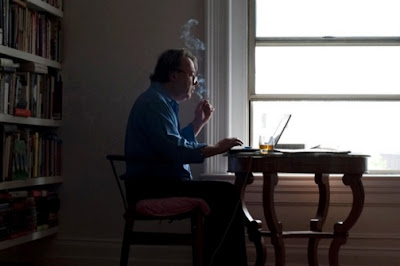Sunday, December 18, 2011
HITCH (1942-2011)
This past Thursday, Dec. 15, 2011, journalist, orator, raconteur and professional contrarian Christopher Hitchens finally succumbed to complications arising from esophageal cancer. He was 62 years old. With his passing, the world has lost one of the great public iconoclasts, a man singularly devoted to the pursuit of truth and the utter destruction of hypocrisy in all it's forms. His targets included Henry Kissinger , Bill and Hillary Clinton, the Dalai Lama, the current Pope, and even Mother Theresa. Not always an easy man to like or admire, Hitchens could be smug, supercilious and blatantly rude. He was, also, the champion of several controversial and, seemingly indefensible, positions, including an unwavering support of the War in Iraq. He was a complicated man for a complicated world.
I suppose I first took notice of him on Bill Maher's "Politically Incorrect" show. I remember being quite struck by this rumpled Englishman saying outrageous things about President Clinton (basically calling him a rapist) but dismissing him as some kind of right-wing whack job. How wrong I was. In Hitchen's youth he was a committed socialist and political activist against the war in Vietnam. It is to his credit as a nuanced writer and thinker that his later support of the war in Iraq seems neither contradictory nor hypocritical.
If you bother to read his various essays and articles leading up the war, you will see that his support is not based in some kind of rah-rah-go-America patriotism or a desire for post 9/11 revenge against the Muslim world. This is a person who spent a lot of time in Iraq, understood the culture, and had many valued friends in that country, and his hatred of Saddam Hussein and his Ba'ath party is based in that experience. In Hitchens' opinion it was the long overdue moral responsibility of the U.S. to remove Hussein from power, the sooner the better. You may disagree, (as I do), but this was not the opinion of a republican war monger, but rather that of a committed humanist outraged on behalf of a nation about which he cared deeply.
If Hitchens was well known for anything in the States it was his tireless and vocal promotion of aetheism and his distaste for religion. This debate is particularly illustrative, as it represents him at his best and worst. When debating religion he could be arrogant and dismissive, taking his anti-god stance as a moral and intellectual given. Conversely, he was, also, at his wittiest and most passionate. I recommend trolling youtube for anything involving Hitchens and religion. There are literally hours of footage of Hitchens debating religion, all of it entertaining, enlightening, and intellectually stimulating. There are worse ways to spend a cold winter afternoon.
As I feared, this post is far too literal and plodding to do justice to such a talented polemicist, but I do want to mention one more important aspect of his writing. He was also a fine literary critic, and I highly recommend any of his essays on great books and authors. This is Hitchens at his happiest, discussing what is really important to him. Of course it helps that he and I are in agreement on many of our favourite writers. I've been thrilled over the years to read his thoughts on such figures as James Joyce, Jorge Luis Borges and Patrick O'Brian and find them so close to my own. It was this, more than his political stances or his anti-religious activities, that made him a personal hero of mine. Well, that and his utter fearlessness in the face of, not only political and intellectual opposition, but his own mortality.
This last observation I will allow Mr. Hitchen's to illustrate in his own words.
http://www.youtube.com/watch?v=QbBVB66DC5k&feature=related
Anyone interested in sampling Christopher Hitchen's work will want to check out his archive on the Slate website. Further reading should include his excellent autobiography Hitch-22, his essay collection Love, Poverty and War, his stirring anti-religion polemic God is Not Great plus: Letters to a Young Contrarian, Why Orwell Matters and Thomas Paine's Rights of Man: A Biography.
Subscribe to:
Posts (Atom)
